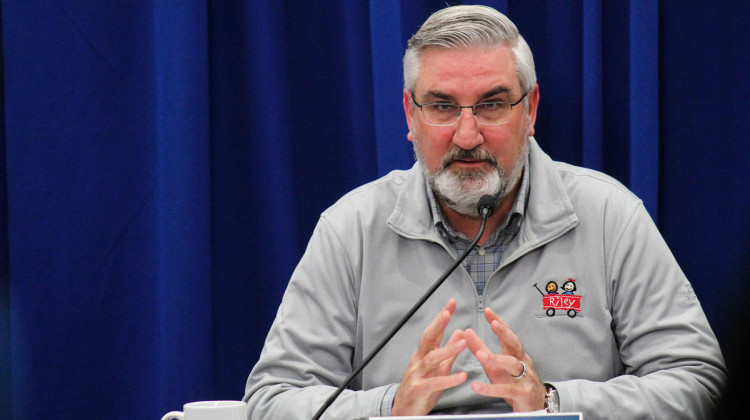
During a press briefing last week, Gov. Eric Holcomb said he was "stunned and somewhat blindsided" by the attorney general's comments.
(Lauren Chapman/IPB News)Indiana reports more than 12,000 new COVID-19 cases in a single day. State health officials raise the alarm about Indiana’s overwhelmed hospitals. And Gov. Eric Holcomb said he was “stunned” by Attorney General Todd Rokita’s comments saying he “doesn’t believe any numbers any more.”
THE DATA
The Indiana Department of Health will not update its COVID-19 data for Friday Dec. 31 until later Monday. But for the last seven days of available data, Indiana reported 45,954 new cases.
Indiana averaged 1,876.2 new cases per day in October and 2,707.3 in November. With the available data for December so far, the state is averaging 4,823.9 new cases per day.
The state reported more than 12,000 new COVID-19 cases Thursday, setting a pandemic record on the heels of an increase in new cases and hospitalizations.
The previous record – 8,436 cases – was set in early December 2020, before Indiana administered its first vaccine doses. The state also set a record Wednesday, reporting 2021’s highest single-day new cases total: 7,941.
But that was obliterated with Thursday’s 12,020 new cases.
All of that follows the state reaching two milestones the week before Christmas: 18,000 confirmed dead and 1.2 million COVID-19 cases.
State health officials say there are an additional 651 suspected COVID-19 deaths – where a test wasn’t administered but health care professionals believe the person had the virus.
The state peaked at an average of 98 deaths per day at the end of 2020. Last summer, that average plummeted to less than 10 per day from April until July. September's average climbed to 39 deaths per day, but slowed slightly in October and November.
Data, especially on COVID-19 deaths, can take up to multiple weeks to roll in. But December's average, so far, has climbed to nearly 42 deaths per day – though that is likely to be slightly higher.
The state’s hospital census has hovered around 3,000, after surpassing it for the first time in 2021 on Dec. 13. The IDOH added 329 new deaths to its total in the last seven days of available data.
OVERWHELMED HOSPITALS
Health officials raise alarm about overwhelmed hospitals ahead of anticipated omicron surge
State health officials are raising the alarm about Indiana’s overwhelmed hospitals.
Dr. Lindsay Weaver is the chief medical officer for the Indiana Department of Health. She said the surge is driven by both new COVID-19 hospitalizations and Hoosiers who had to delay care because of the pandemic.
“Our current total hospital census is currently at the highest it has been in five years. And we’re over 1,500 patients higher than our peak last year,” Weaver said.
The state’s COVID-19 hospital census had not surpassed 3,000 in 2021 until Dec. 13.
Weaver said the best way to help health care workers is to get vaccinated – more than 80 percent of COVID-19 hospitalizations are unvaccinated Hoosiers.
IU Health sees record number of COVID-19 patients
Indiana’s largest hospital system has more COVID-infected patients now than at any point during the pandemic.
Dr. Chris Weaver, IU Health’s chief clinical officer, told reporters at a press briefing on Thursday, the system’s 16 hospitals across the state are at 120 percent capacity, with more than 2,000 patients.
About 550 patients are hospitalized with COVID-19, and more than six patients are dying from the virus every day.
“In addition to that, we’re very busy with all other illnesses as well,” Weaver said. “Our workforce has been really strained over the last two years, as you can imagine. And like everyone else in the country, health care and not, we do have a workforce shortage that we’ve seen.”
Weaver said even fully staffed, it would be difficult for IU Health’s clinicians to care for this most recent surge in hospitalizations, which started in early November. With staff out sick with COVID-19 or quarantining, the workforce shortage has caused a major strain on hospitals. But Weaver said the shortage is not being caused by employees who left after the system required them to get the COVID-19 vaccine.
As hospitalizations rise, industry leaders call on unvaccinated to get COVID-19 shot
Indiana business and hospital leaders called on unvaccinated people to get the shot as the state continues to hover around more than 3,000 COVID-19 hospitalizations.
That’s the highest number since last December. And along with that, only 13 percent of the state’s ICU beds remain available.
Those numbers are affecting health care and businesses around the state.
“We’re here today to urge everyone into action, because we need the healthcare system to be here, not just for those with COVID, but to support all healthcare needs,” said Brian Tabor, Indiana Hospital Association president.
That call to action includes getting vaccinated. COVID-19 hospitalizations are up 149 percent since mid-November. And 90 percent of those hospitalized with COVID-19 are unvaccinated.
With high hospitalizations due to COVID-19, experts caution flu could strain limited sources
As hospitalizations from COVID-19 remain high, health experts caution influenza could further strain already limited resources.
Dr. Scott Stienecker is a Fort Wayne epidemiologist with the Society for Healthcare Epidemiology of America. He said hospitals in the northeastern part of the state are already above 100 percent capacity.
“And we’re just starting to see the rapid rise of influenza, with predominantly H3 and 2 strain. … It often tends to be very severe, requiring a higher rate of hospitalization,” Stienecker said.
Last year’s flu season was exceptionally mild. In fact, Indiana only reported seven flu deaths – compared to 137 during the 2019-2020 season. Stienecker said that’s because people were social distancing, wearing masks and staying home.
Is Indiana ready for omicron COVID-19 cases? Expert says yes – if Hoosiers get vaccinated
Is Indiana ready for omicron? One epidemiologist said the public health system is ready for the latest COVID-19 variant – but still needs Hoosiers’ help by getting vaccinated.
Indiana ranks near the bottom of U.S. states for vaccinations, with fewer than 55 percent of the total population fully vaccinated.
Dr. Scott Stienecker is an epidemiologist with the Society for Healthcare Epidemiology of America. He said Indiana’s low vaccination rates are a reason for concern as the state reports its first sampled omicron tests.
“Those who have been vaccinated – and especially boostered – are really pretty darn well protected,” Stienecker said.
THE STATE’S RESPONSE
Indiana updates K-12 school guidance after CDC offers new COVID-19 isolation rules
Indiana officials updated guidance for K-12 schools after the Centers for Disease Control and Prevention announced new isolation guidelines for COVID-19 cases this week, and masking largely determines how long students have to stay home.
Indiana officials have said unvaccinated students exposed to COVID-19 in the classroom don't have to quarantine if they don't develop symptoms and everyone is properly wearing a mask. That's still the case.
But unvaccinated students exposed outside of school or in classrooms without masks should quarantine for at least five days. Vaccinated students can keep going to school as long as they wear a mask for 10 days following exposure.
Holcomb says he was ‘blindsided’ by Rokita’s COVID-19 data comments
Gov. Eric Holcomb responded to Attorney General Todd Rokita’s statements that he doesn’t trust the state’s COVID-19 data. The governor called the comments demoralizing.
In an interview at the end of December with WSBT in South Bend on vaccine mandate lawsuits, Rokita said he “doesn’t believe any numbers any more” and said the data has been “politicized from day one.”
Holcomb responded to those comments during a recent COVID-19 news briefing.
“I will say that I was stunned and somewhat blindsided by the attorney general when he said he didn’t trust any information. Because that, to me, hit home,” Holcomb said.
Holcomb thinking about message sent by ending public health emergency
Indiana is in the midst of one its worst surges of COVID-19 and state government leaders are still preparing to end the public health emergency in the near future.
Gov. Eric Holcomb has already laid out the technical side to ending the public health emergency. There are only three legislative changes he needs lawmakers to make to ensure Indiana won’t lose hundreds of millions in federal funding tied to the pandemic.
Beyond that, ending the emergency is a lot about symbolism – what message it sends to Hoosiers still dealing with COVID-19.
Holcomb said he’s aware of that.
“How you say it and when you do it and how you do it will be important to how it’s consumed or digested,” Holcomb said.
THE HEADLINES
Holcomb at odds with lawmakers over COVID-19 vaccine mandate ban
Gov. Eric Holcomb remains opposed to banning private companies from enforcing their own COVID-19 vaccine mandates.
And the governor has held firm in his view on any government mandate surrounding the vaccine.
Holcomb’s position puts him in opposition to the Biden administration’s push to require employers to get their workers vaccinated and to an effort by Statehouse Republicans to stop private companies from enforcing their own vaccine requirements.
Join the conversation and sign up for the Indiana Two-Way. Text "Indiana" to 73224. Your comments and questions in response to our weekly text help us find the answers you need on statewide issues.
Holcomb said he and Republican legislative leaders have an “understandable difference of opinion.”
“You’ll see a difference of opinion even inside the House and the Senate,” Holcomb said. “And they’ll have to work that out.”
People who’ve testified before lawmakers said companies aren’t respecting their requests for medical and religious exemptions to getting the vaccine. Holcomb said he’ll look into that.
“On the flip side, a lot of employees want to be in a situation where they feel safe,” Holcomb said.
Holcomb takes lessons from nearly two years of the COVID-19 pandemic
Indiana – like the rest of the country – is approaching two full years of living under the COVID-19 pandemic.
Gov. Eric Holcomb said one of the biggest lessons in governing he’s learned in that time is how to rely on the team around him.
“And remaining calm is what not just gets this administration through, collectively, but it also gets a lot of other folks who are anxious or worse,” Holcomb said.
Many of Holcomb’s decisions during the pandemic have been sharply unpopular among the conservative wing of his party: “Stay At Home” restrictions, the mask mandate, his push to get people vaccinated.
Yet he also won re-election in the middle of it by a wide margin.
Andrew Downs, Mike Downs Center For Indiana Politics director, said if Holcomb hopes to run for office in the future, he’ll have to grapple with those decisions.
Winter graduates from Vincennes University reflect on going to college during COVID-19
Universities across Indiana held ceremonies celebrating winter graduates this month, and some from Vincennes University reflected on their experiences after they crossed the stage ahead of the end of year holidays.
Vincennes University's mid-year commencement was the school's first in-person ceremony since the COVID-19 pandemic started. Graduates who attended the ceremony said they're grateful – and a bit surprised – it was held in person after months of virtual or hybrid learning.
Parker Timberman was the student commencement speaker. He said going to school during COVID-19 has been hard, but encouraged current students to keep pressing ahead.
"Things are going to be hard, but you just do the best you can. And if your best is truly your best, then there's nothing to be ashamed of," he said.
Contact Lauren at lchapman@wfyi.org or follow her on Twitter at @laurenechapman_.
 DONATE
DONATE



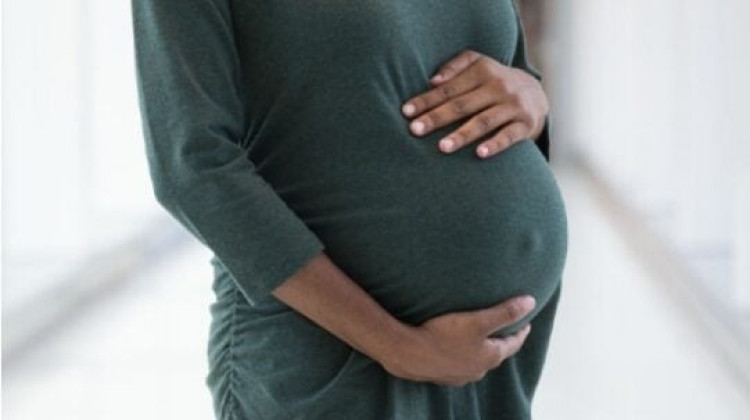


 View More Articles
View More Articles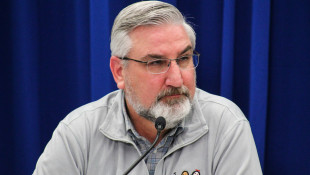
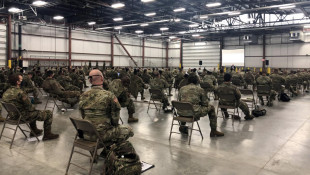
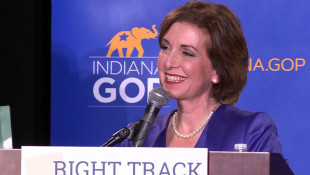

 Support WFYI. We can't do it without you.
Support WFYI. We can't do it without you.